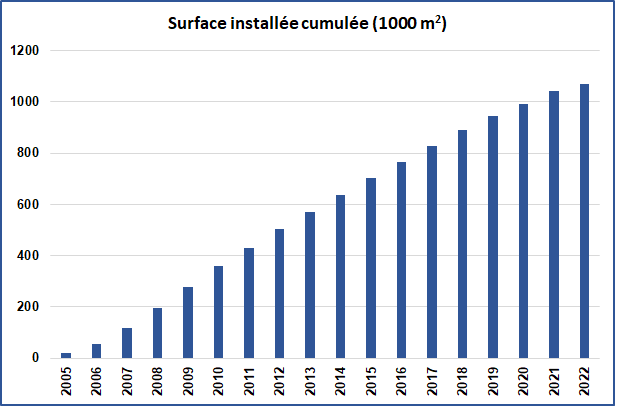Introduction
Tunisia is considered one of the pioneering countries in the field of solar water heating. The first experience began in the 1980s with the creation of a local manufacturing core and the establishment of a financing mechanism.
A second program took over in 1995 through the Global Environment Facility (GEF: 1995-2001) with the implementation of several incentive measures: granting bonuses of 35%, a minimum customs duty of 10%, and VAT exemption. These measures helped revive the solar water heater market in Tunisia with the creation of a network of local suppliers and installers, but the market declined again after the end of the GEF program in 2001.
From 2005 onwards, following the promulgation of Law No. 2004-72 relating to energy management and the creation of the National Energy Management Fund in 2005, a new program was launched under the name PROSOL Residential. This program increased the rate of achievement from 7,000 m² in 2004 to an average of approximately 70,000 m²/year since 2007.
The pace of achievements has also continued with the establishment of the Energy Transition Fund in accordance with the 2014 Finance Law, replacing the National Energy Management Fund, and then the promulgation of the new regulatory framework for this fund through the publication of Decree No. 2014-2014.
This success is mainly due to several factors, including the innovative financing mechanism through the granting of subsidized loans by a commercial bank, the guarantee of payment of loans granted by STEG, the granting of a bonus by the ETF, and tax incentives (minimum customs duty of 10% and 0% VAT).
Tunisia, with more than 1 million m² installed, was ranked in the Top 20, in terms of kWth/1000 inhabitants, of installed solar thermal capacities in 2018 worldwide, using flat plate collector technology. The PROSOL program was selected by the IEA among the 05 best national policies for promoting solar thermal energy in the world, as part of the ‘Solar Heating and Cooling Solar Award 2017’ (http://www.iea-shc.org/solar-award).
From 2019, the program experienced a decrease in the rate of achievement, particularly for solar water heaters with a capacity of more than 300 liters, due to the high prices of these devices and the limited subsidy ceiling. Consequently, in 2022, as part of the amendment of government decree No. 983 of 2017, the subsidy granted to this program was increased, this subsidy for solar water heaters with a capacity of less than 300 liters became equivalent to 400 dinars instead of 200 dinars, and a subsidy of 700 dinars instead of 400 dinars for heating devices with a capacity of more than 300 liters.
During the period 2005-2022, this program equipped approximately 400,000 households with solar water heaters (more than one million square meters of surface area) and achieved combined energy savings equivalent to 728 ktoe. This program also contributed to reducing state energy subsidies by approximately 809 million dinars (approximately 52 million gas cylinders since the program’s launch) over the period of its implementation, in exchange for investment subsidies from the Energy Transition Fund that did not exceed 100 million dinars.
The number of approved installation companies reached 680, and within the framework of the QUALISOL quality system, suppliers were able to offer 270 types of solar water heaters approved by the agency. The program also enabled the creation of an industrial fabric with an integration rate ranging between 30 and 65%, since the number of industrial units reached 10 manufacturing companies, 6 of which are in continuous operation and contribute to covering 90% of the local solar water heater market. This program also created more than 8,000 direct and indirect jobs.

